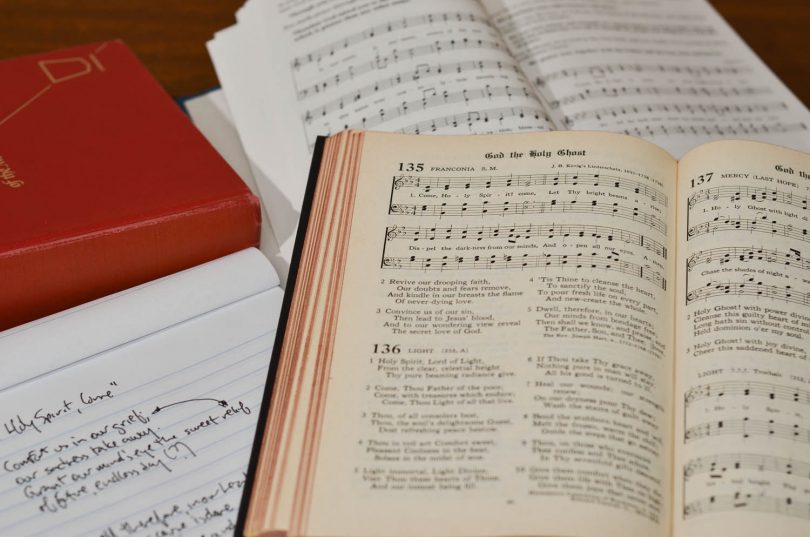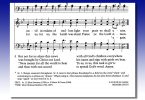In making plans for the memorial service for my uncle, the Rev. Christian D. “Chris” Weber (see obituary, page 29), I was looking for hymn texts related to the Holy Spirit. The person and work of the Holy Spirit was an important influence and interest in my uncle’s life and ministry, so I wanted some hymns that would reflect that in his service. We already have several good “Spirit” hymns in the Moravian Book of Worship—“Holy Spirit, Ever Dwelling” (495), which C. Daniel Crews wrote specifically for the Book of Worship, and “Come Spirit, O Love Divine” (492), which has very old words but was new to the blue hymnal—but none of them seem to fit the context of a memorial service.
I have long liked the tune and the words to “Come, Holy Spirit, Come,” which have been part of the Liturgy of Adoration in the 1969 Hymnal of the Moravian Church and the 1995 Moravian Book of Worship. I thought these words, having been familiar for so long, would be easy for most of those attending the memorial service to sing. However, there is only one verse presented in the Liturgy of Adoration, and I had hoped there would be more verses to sing.
Sallie Greenfield, a dear friend of my uncle’s, showed me her copy of the 1923 Hymnals and Liturgies of the Moravian Church (Unitas Fratrum). There, I was grateful to find four more verses (hymn 135).
Joseph Hart (1712-1768) had composed the hymn text of five verses in 1759. Earlier Moravian hymnals had all these verses, but by the 1969 Hymnal of the Moravian Church, Moravians used only the first verse as part of the Liturgy of Adoration. The editors of the 1995 MBW then altered the wording slightly, substituting “your” for “Thy” in the second line and “now” for “Thou” in the last line.
Unfortunately, but not surprisingly, the verses that we found in the 1923 hymnal were full of archaic pronouns and phrasing; furthermore the words just did not seem helpful for a memorial service. However, I was drawn to some of the words of the second verse, and I liked the Trinitarian theme of the last verse.
As I sat down to work with these verses, thoughts relevant to a memorial service began to emerge. Trying new words, within about 15 minutes the themes “Spirit tending to our weak humanity” and “giving us something eternal” were taken from the second verse from the original hymn:
Revive our drooping faith,
Our doubts and fears remove,
And kindle in our hearts the flame
Of never-dying love.
and became:
Comfort us in our grief;
our sadness take away.
Grant our mind’s eye the sweet relief
of future, endless day.
For me these changes created words directly relevant to the context of a memorial service. Instead of addressing “drooping faith,” “doubts” and “fears,” which might be a concern at a time of loss, these new words spoke to the inevitable grief and sadness that come with death. Furthermore, the concept of the eternal in the original verse dealt with the nature of faith. The new words translate that interest in the eternal to future, heavenly relief from the troubles of this world, and prays that we might have a vision of that even now.
I then worked on the original final verse. I re-wrote:
Dwell, therefore, in our hearts;
Our minds from bondage free;
Then we shall know, and praise, and love,
The Father, Son and Thee.
to read:
Dwell, therefore, in our hearts.
Until our course is done,
we’ll offer praise and love to You
the Father and the Son.
The new words erase the archaic language and continue to deal with the present realities of the life of faith while adding in a future focus, and maintain the original verse’s focus on the Trinity: Father, Son and Holy Spirit.
Next, I emailed these new verses to several friends who have an ear for hymns. I did this to make sure I was not forcing syllables into rhythms or forcing awkward emphases in words that did not fit the hymn’s original meter. I recognize that my mind can do that without my realizing it; when others read those same verses, they see the problems that I may have glossed over. In addition, another set of eyes can sometimes offer better rhyme schemes or phrasing.
I was glad I asked for their help. Within minutes I had received an email from Gwyn Michel, assistant director of the Moravian Music Foundation, which included the following suggestions: “The only changes I considered were possible ones to the third verse, but at least one of these would make the text more archaic (ARGH!) and the other is perhaps a theological issue….
Dwell, thou within our hearts. (more archaic)
Until our course is done,
we’ll offer praise and love to You
and rise with God, the Son. (???)”
As Gwyn noted, one of her suggestions was more archaic, so I tried to work around that, but I really appreciated the new theological development of the last line—resurrection, which was perfect for a memorial service. I then used the same solution that the editors of the Book of Worship had used in moving from the older hymnal versions; that is, changing “thou” to “now.” I then suggested this verse back to my friends.
Dwell, now within our hearts.
Until our course is done,
we’ll offer praise and love to You
then rise with God, the Son.
After that, two more suggestions came in. Nola Knouse, director of the Music Foundation, suggested changing “Dwell, now within our hearts.” to “Dwell, Spirit, in our hearts.” Her change brought the focus of this last verse and therefore of the hymn back to the Holy Spirit, which proved to be a very helpful suggestion.
Jane Weber suggested altering a line of the second verse from “Grant our mind’s eye the sweet relief” to “Bring to our heart the sweet relief.” I liked the fact that her words were more accessible; after all, we all talk about our hearts, but who normally refers to “the mind’s eye?” However, I could not figure out how to work with those words to maintain the theme of a future focus in the way that “mind’s eye” does, so I did not make that change, even though I recognized that it was in some ways an improvement.
By combining my work with the input of others, this hymn appeared—in some ways revised, in some ways new—and was sung at my Uncle Chris’ memorial service:
Come, Holy Spirit, come!
Let your bright beams arise;
dispel the darkness from our minds,
and open now our eyes.
Comfort us in our grief;
our sadness take away.
Grant our mind’s eye the sweet relief
of future, endless day.
Dwell, Spirit, in our hearts.
Until our course is done,
we’ll praise the Father, Son, and you
then rise with God, the Son.
I offer this narrative in the hope that it may be helpful to others in several ways. First of all, I hope this hymn may be helpful to pastors and families planning funerals and memorial services. I believe these verses speak to an unmet need, or at least add to the resources available for welcoming the presence of the Holy Spirit at funerals and memorials where that is seen as especially relevant or desirable.
Secondly, I hope it may be helpful to those who write hymns, or at times have words come to them or inspire them, and then wonder what to do with them. I am not a hymn writer, but sometimes words come to me. When that happens, I am grateful to be part of a larger community that has helped me process and polish words and ideas, which can then, I hope, be a gift back to that larger community.
The Rev. Dr. C. Riddick Weber is associate professor of pastoral ministry and the chaplain for the Moravian Theological Seminary. This article is excerpted from a larger series of articles that will be published in the Moravian Music Foundation’s newsletter.
Editor’s Note: In 2018, the Moravian Magazine will introduce a regular feature to inspire creative, spiritual Moravian worship. These features will include new music (and new ways of using old music); stories about how new Moravian music is created; topical and insightful liturgies; ideas for Moravian worship opportunities; and ways for those interested to create new worship resources.







